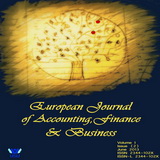| |
Article from Volume 1, Number 2, Year 2013| SUSTAINABILITY IN FISCAL POLICY IN BOOM AND RECESSION-THE CASE OF ROMANIA | 
Download | | Author(s): Mihaela Gondor | | DOI: 10.4316/EJAFB.2013.124 | | Abstract: This paper examines the interrelated aspects of the recent economic and fiscal crisis - such as the GDP growth, budgetary deficit and public debt, fiscal policy and austerity measures in Romania by comparing the different effects caused by different fiscal policies within a boom period and a downturn period.
The paper reveals that the boom period is characterized by tax rate cuts and rising of expenditures and the downturn period, by the increasing of fiscal burden and sharply reducing the government spending. In this perspective, the aim of this paper is to provide some empirical basis for the argument that pro-cyclical fiscal policy does not assist in dampening the GDP shocks. | | Keywords: Fiscal Policy, Pro-cyclical, Counter-cyclical, GDP Growth. | References:
1. Akitoby, Bernardin, Benedict, Clements, Sanjeev, Gupta And Inchauste, Gabriela. (2006), Public Spending, Voracity, And Wagner’s Law In Developing Countries, European Journal Of Political Economy, No. 22: 908– 924.
2. Alesina, A., F. Campante And G. Tabellini, (2007), Why Is Fiscal Policy Often Procyclical?, Journal Of European Economic Association And NBER Working Paper,No.11600
3. Battaglini, Marco And Coate, Stephen, (2008), Fiscal Policy Over The Real Business Cycle: A Positive Theory, NBER Working Paper, No. 14047: 3-59
4. Baldacci, E., Gupta, S., Granados, C., M., (2009), How Effective Is Fiscal Policy Response In Systemic Banking Crises?, IMF Working Paper, No. 09/160: 1-39
5. Bank For International Settlements (2003) Fiscal Issues And Central Banking In Emerging Economies, BIS Papers, No. 20: 1-9
6. Cohen, D., Follette, G. (2000), The Automatic Fiscal Stabilizers: QuietlyDoing Their Thing, Federal Reserve Bank Of New York Policy Review, No. 6: 35—68
7. Christiano, L., M. Eichenbaum And S.Rebelo, (2011), When Is The Government Spending Multiplier Large?, Journal Of Political Economy, Vol. 119, No. 1: 78–121
8. Dima B., Moldovan, N., Lobon?, O., (2010), Correlation Between Electoral Cycle And Fiscal Policy Decisions In Romania, E U R O E C O N O M I C A, Issue 1(24)/2010 ISSN: 1582-8859, P 45-55
9. Dima, B., Dima, S., M., Lobont, O., R., (2013), New Empirical Evidence Of The Linkages Between Governance And Economic Output In The European Union, Journal Of Economic Policy Reform, 16:1, 68-89, DOI: 10.1080/17487870.2012.759427
10. Dinga, E., (2009), Despre Stabilizatorii Fiscali Automa?i, Studiu ?tiin?ific, Http://www.edinga.ro/site/vezistudiu.php?id=6
11. Gordon, D., B., Leeper, E., M., (2005), Are Countercyclical Fiscal Policies Counterproductive? NBER Working Paper, No. 11869: 25-31
12. Ilzetzki, E. And Végh, C., (2008), Procyclical Fiscal Policy In Developing Countries: Truth Or Fiction, NBER Working Paper, No. 14191
13. Kaminsky, G., Reinhart, C. And Vegh, G., (2004), When It Rains, It Pours: Pro-cyclical Capital Flows And Macroeconomic Policies, In M. Gertler And K. Rogoff, Eds., NBER Macroeconomics Annual, Vol.19
14. Kraay, A. And Servén.L., (2008), Fiscal Policy Response To The Current Financial Crisis: Issues For Developing Countries, Journal Of Macroeconomic And Growth Research
15. Lambsdorff, J., G., (2011), Transparency International Corruption Perceptions Index (CPI), 1998-2011, Available On Transparency’s International Coalition Against Corruption Site: Http://archive.transparency.org/policy_research/surveys_indices/cpi/2008/methodology
16. Lane, P., (2003), The Cyclical Behavior Of Fiscal Policy: Evidence From The OECD, Journal Of Public Economics, No. 87: 2661-2675
17. Rzo?ca, A. And Ci?kowicz, P., (2005), Non-Keynesian Effects Of Fiscal Contraction In New Member States, ECB Working Paper, No. 519: 3-36
18. Serven, L., (1998), Macroeconomic Uncertainty And Private Investment In LDCs: An Empirical Investigation, Working Paper No. 2035. Washington
19. Taylor, J., B., (2000), Reassessing Discretionary Fiscal Policy, Journal Of Economic Perspectives, No. 14(3): 21—36
20. Talpos, I., Avram, A., (2011), Consideratii Cu Privire La Mixul De Politici Fiscal Anticriza In Romania, Economie Teoretica Si Aplicata, Volumul XVIII, No. 1(554), Pp. 3-22 21.Talvi, E. And Vegh, C., (2005),
21. Tax Base Variability And Pro-cyclical Fiscal Policy, Journal Of Development Economics, No. 78: 156-190. |
| | Back to journal ... |
|
|

